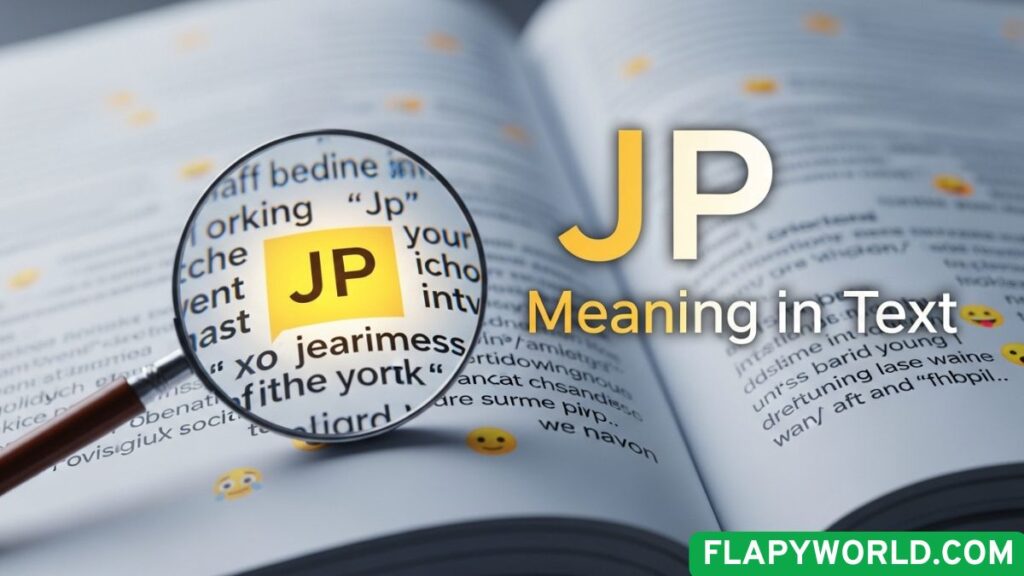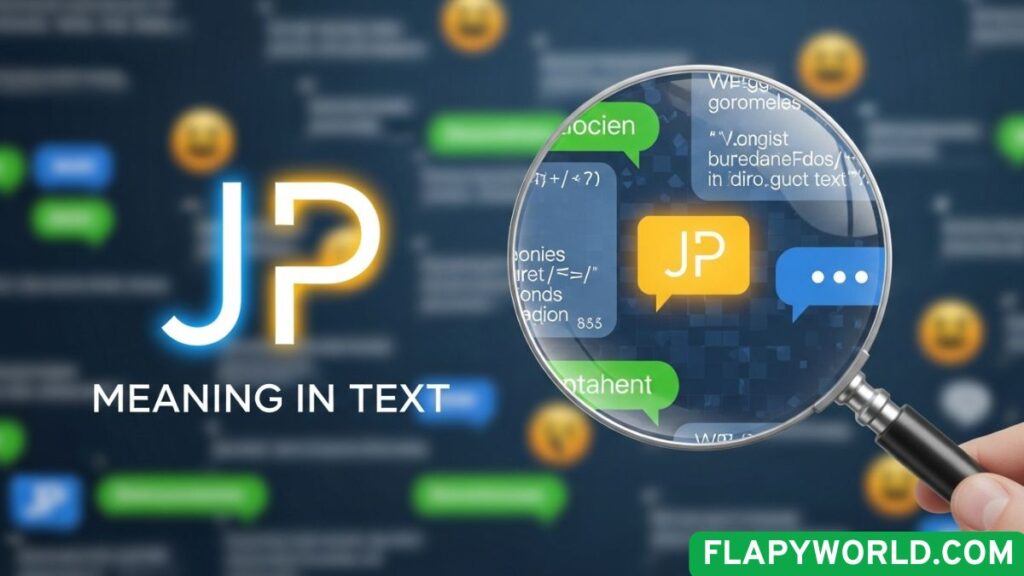JP Meaning in Text stands for “Just Playing” or “Just Joking.” It’s a fun way to tell someone you’re not being serious. People use it to add humor or ease tension in chats. It makes online conversations feel more friendly and relaxed.
Ever sent a message that sounded too serious? That’s where JP saves you. It helps fix awkward moments with just two letters. It’s quick, easy, and keeps the mood light. Everyone loves a little laugh, even in text.
The JP Meaning in Text is common on TikTok, Instagram, and gaming chats. It’s like saying “I’m only kidding.” You’ll see it at the end of jokes or teasing messages. It helps people understand your tone and avoid confusion online.
Definition & Meaning
The JP meaning in text usually stands for “Just Playing.” It’s a friendly abbreviation people use to show that a message isn’t serious. Think of it as the modern way to say “just joking” or “kidding.” For example, if your friend texts, “You’re the worst at this game! JP,” they’re teasing you, not being mean. The JP slang meaning helps soften statements, add humor, and prevent misunderstandings. It keeps conversations light and playful, especially in casual settings like texting, gaming, or commenting on social media.
Sometimes, JP abbreviation can mean different things based on context. In professional environments, it might refer to “Job Posting.” In cultural or geographic discussions, JP full form can mean Japan or Japanese abbreviation JP. That’s why you should always pay attention to the conversation’s tone and topic to understand the real meaning of JP 2025 in each situation.
Background & History
The story of JP in texting goes back to the early days of online chatting when users had to save characters and respond quickly. Shortcuts like LOL, BRB, and JP became part of everyday internet slang terms. Early gamers and chat users wanted a fast way to show they were joking, so they typed JP instead of writing full phrases. Over time, this chat acronym explained moved from gaming chat rooms to mainstream social media and texting platforms.
Today, the JP acronym meaning continues to evolve across apps like TikTok, Snapchat, and Twitter. You’ll find thousands of posts using JP humor to add personality and sarcasm. On urban dictionary, JP meaning in chat still lists “Just Playing” as the most common interpretation. Yet, what makes it timeless is how it adjusts to tone—sometimes funny, sometimes casual, and sometimes even romantic when used playfully in online communication tone.
Usage in Various Contexts
Understanding how to use JP correctly depends on the setting. It’s not a one-size-fits-all abbreviation. While JP in social media can make a caption funnier, JP in gaming context often lightens tension between players. In texting, it’s your quick way to say, “Don’t take me seriously.”
Texting
Imagine you’re chatting with a friend who says, “You’re always late!” If they add JP, it changes everything. Without it, it might sound rude; with it, it becomes a light tease. That’s the power of JP meaning in text. It adds emotional clarity, making sure humor is understood. Many texting abbreviations exist for tone, but JP stands out for its simplicity.
Social Media
Social media thrives on quick humor. When you see captions like “Just ate an entire pizza by myself… JP (or not really),” the writer uses JP in social media captions to appear funny or self-aware. On TikTok, JP meaning on TikTok often appears in comments where users clarify jokes or exaggerated statements. It’s a shorthand that helps creators connect authentically with their audience while keeping things casual.
Gaming
In the JP in gaming context, the abbreviation brings laughter during competition. Gamers use it when joking about skills or teasing teammates. For example, a player might say, “You can’t beat me, JP!” It keeps the chat friendly and prevents conflict. The JP slang meaning became a staple of online chat abbreviations because it helps maintain a fun, stress-free atmosphere during intense matches.
Common Misconceptions & Clarifications
Many people assume JP abbreviation always stands for Japan, especially in global chats or gaming communities. However, the JP meaning in text mainly refers to “Just Playing” in American slang. Another misconception is that it can be used anywhere, even in business chats. In reality, JP in professional messages should be avoided unless you know the person well. It’s too casual for formal settings. You can think of it as you would a joke—perfect among friends, awkward in a job interview.
Similar Terms & Alternatives
To understand JP vs JK difference, look at how each sets tone. JP texting guide and JP vs LOL comparisons can help you decide when to use each. The following table shows similar terms and how they work:
| Term | Meaning | Example |
| JP | Just Playing | “You’re terrible at this! JP.” |
| JK | Just Kidding | “You’re crazy! JK.” |
| LOL | Laughing Out Loud | “That was funny! LOL.” |
| /s | Sarcasm | “You’re a genius /s.” |
| TBH | To Be Honest | “TBH, that wasn’t my favorite.” |
Understanding these alternatives helps you maintain the right online communication tone and ensures your humor lands as intended.
Read Also: OMS Meaning in Text: The Ultimate Guide to This Popular Acronym
How to Respond to This Term
When someone uses JP, the way you respond depends on your relationship and the context. You can reply casually, humorously, or professionally while keeping tone in check.
Casual Response
If a friend texts, “You’re so lazy! JP,” you could reply, “Haha, I know!” or “You wish!” This relaxed exchange keeps the conversation friendly and shows you understood the just playing meaning.
Funny Response
You can also be witty. Try saying, “JP? More like Just Perfect!” or “JP? Sure, I totally believe you.” It adds humor while acknowledging their joke. These JP examples in conversation make texting lively and personal.
Professional Response
In a workplace chat, JP in professional messages should be handled carefully. If a colleague writes, “We missed the report deadline. JP!” you could respond, “Good one, but let’s meet the next one.” This keeps things respectful yet light-hearted, fitting for semi-formal office banter.
Regional or Cultural Differences
The JP cultural variations are fascinating. In the U.S., people understand it as just joking meaning, but in Japan, JP abbreviation usually refers to the country itself or something Japanese. In gaming communities, JP in gaming can describe Japanese servers or players. Context makes all the difference. Americans see JP informal meaning as humor; others might see it as geography.
Comparison with Similar Terms
Comparing JP vs JK or JP vs LOL highlights its uniqueness. JK directly says “just kidding,” while LOL means laughter. JP, on the other hand, mixes teasing with friendliness. It’s like a wink in text form. Among all modern slang meanings, JP stands out as playful yet subtle—less loud than LOL, more social than JK. It’s a sign of someone who knows how to balance humor and sincerity in messages.
Usage in Online Communities & Dating Apps

In online chat abbreviations, JP appears everywhere—from Reddit threads to dating profiles. On Tinder, people might write, “Looking for someone who loves sushi… JP (or maybe not).” This playful tone adds personality. In online communities, JP meaning in chat helps users appear approachable and relatable. It’s part of a growing trend where humor breaks barriers and makes digital communication more human.
Hidden or Offensive Meanings
While JP humor meaning is mostly harmless, using it excessively or sarcastically can backfire. For example, joking about sensitive topics and adding JP doesn’t make it okay. In 2025’s world of fast communication, tone matters more than ever. Always consider the reader’s feelings before joking, even with something as simple as JP in texting.
Suitability for Professional Communication
In business, it’s better to use full words than abbreviations. The JP meaning in professional context doesn’t belong in formal writing. Instead, say, “Just kidding,” or avoid humor entirely in sensitive communications. Using JP abbreviation in emails might confuse or appear unprofessional. Save it for friends, chats, or social posts where lighthearted language fits naturally.
Read Also: ‘Ight’ Meaning in Text: A Complete Guide to This Popular Online Slang
7 Better Alternatives to “JP” in Text (Polite, Casual & Professional)
1. “Just kidding ????”
This is the most common and friendly substitute for JP meaning in text. It instantly clarifies that you’re joking and prevents misunderstandings. It works perfectly in casual chats with friends or family. Example: “You owe me lunch! Just kidding ????.”
2. “I’m joking, of course”
A polite and gentle alternative, this phrase fits when you want to maintain warmth while sounding mature. It’s ideal for texts with colleagues or acquaintances. Example: “You’re always late—I’m joking, of course.”
3. “Don’t take that seriously”
Use this when your humor might be misinterpreted. It’s slightly formal but still friendly, making it suitable for semi-professional chats. Example: “That meeting was a disaster! Don’t take that seriously.”
4. “Playing around”
This casual and relaxed phrase captures the just playing meaning behind JP. It’s great for friends or gaming buddies who understand your sense of humor. Example: “You really think I’d lose? I’m just playing around.”
5. “Messing with you”
Perfect for playful teasing. It’s informal and often used among close friends. Example: “You think I’d forget your birthday? I’m just messing with you.”
6. “Kidding!”
Short and snappy, this word carries the same humor as JP but sounds more natural in American English. It’s perfect for texts, tweets, and quick messages. Example: “You’re fired! Kidding!”
7. “I’m only teasing ????”
This version adds warmth and a touch of emotion with the emoji. It shows you’re being friendly, not sarcastic. Example: “You’re such a terrible cook! I’m only teasing ????.”
The Nuances of Using “JP” in Text
The nuances of using “JP” in text depend on tone, timing, and relationship. While JP meaning in text usually stands for “just playing” or “just joking,” it can sound either friendly or confusing based on context. In casual chats, it lightens the mood, but in formal messages, it feels unprofessional. Understanding your audience matters.
Cultural and generational differences shape how JP in texting is understood. Younger people on social media use it freely, but older users might misread it. Always adjust your tone based on the platform. In friendly spaces, it’s playful, yet in professional settings, clearer words work better.
FAQ’s
What does JP mean in text?
It means “Just Playing” or “Just Joking,” used to show that a message or comment isn’t serious.
What is the meaning of JP?
JP stands for “Just Playing,” often used in chats to express humor or light teasing.
Is JP short for something?
Yes, it’s short for “Just Playing” or “Just Joking,” depending on the tone of the message.
What does JP stand for on Instagram?
On Instagram, JP means “Just Playing” and helps clarify that a caption or comment is playful.
What does IG mean from a guy?
IG means “I Guess” in casual talk or Instagram when referring to the social media app.
Conclusion
The JP Meaning in Text shows how people use short words to sound friendly and fun online. It means “Just Playing” or “Just Joking.” Many people use it when chatting to make others smile and know they are not serious. It helps friends talk easily and keeps the mood happy. Using JP makes texting more relaxed and natural. It is one of the simplest ways to share humor without confusion.
Learning the JP Meaning in Text helps you understand messages better. You can use it to joke kindly or reply to someone’s funny comment. It is best for casual talks with friends, not for school or work chats. Knowing its meaning makes you a better texter and keeps your online talk polite and fun.

James Morris is an experienced blogger and content creator at FlapyWorld.com. With a passion for writing and sharing insightful content, James specializes in crafting engaging posts on a variety of topics, including wishes, messages, and inspirational content. His goal is to inspire, inform, and connect with readers through thoughtful and well-researched articles.







